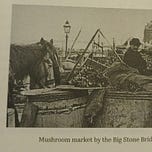Mushrooms are neither animals nor plants. If taxonomists are to be believed, mushrooms are closer to us than either we or mushrooms are to plants. Like animals, mushrooms breathe in oxygen and breathe out carbon dioxide, thus contributing to global warming in their own small way. The cell walls of mushrooms are not made of cellulose like those of plants, but of chitin like those of insects and crustaceans. Some mushrooms are decomposers of dead wood or other organic matter, but others form vast mycelial networks which exist in symbiosis with living trees and enable communication and the sharing of nutrients between trees. Approximately 14 000 mushroom species have been described by scientists, but the total number living today is estimated to be somewhere between half a million and five million - no one seems to know with any degree of precision.
Mushrooms are not specifically mentioned in the Bible. Possibly, ancient authors mistakenly assumed that mushrooms were plants - plants, of course, are mentioned in the Bible - but this is not very likely. Some Jewish rabbis speculate that there were no mushrooms in the Garden of Eden before Adam sinned, since there was no death - nothing died, not even trees, and mushrooms had nothing to decompose. This misses the full complexity of mushrooms but is not altogether unreasonable. Scientists point out, for example, that there was a time when plants already lived on land, but fungi had not yet evolved. This created an environment in which plants were dying, but there were no fungi to decompose them, which in turn led to the formation of coal deposits. Since the appearance of fungi, no more coal deposits are possible, and there are no new coal deposits in the making now.
Listen to this episode with a 7-day free trial
Subscribe to Phroneo to listen to this post and get 7 days of free access to the full post archives.












